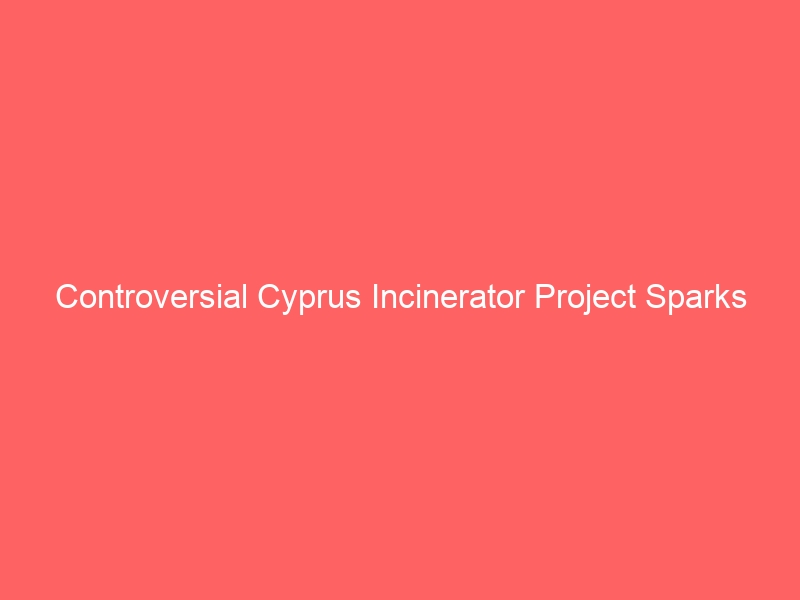Controversial Cyprus Incinerator Project Sparks Environmental Concerns
Cyprus, the beautiful island nation in the eastern Mediterranean, has long been a popular tourist destination known for its stunning beaches, rich history, and vibrant culture. However, in recent years, the island has been at the center of a controversial debate over the construction of a waste incinerator. The proposed project has sparked environmental concerns and has divided public opinion, with many expressing their opposition to the incinerator over fears of its potential impact on the environment and public health.
The issue of waste management in Cyprus has been a pressing concern for many years. The island produces a significant amount of waste, and the current landfill sites are nearing maximum capacity. As a result, the government has been seeking alternative solutions to manage the growing waste problem. One of the proposed solutions is the construction of a waste-to-energy incinerator, which would burn the island’s non-recyclable waste and generate electricity in the process.
Supporters of the incinerator argue that it is a necessary step in addressing the island’s waste management challenges. They claim that the incinerator will reduce the need for landfill sites, which are environmentally damaging and pose a threat to public health. Additionally, proponents of the project argue that the incinerator will help Cyprus meet its renewable energy targets and reduce its dependency on fossil fuels.
However, opponents of the incinerator project have raised serious concerns about its potential environmental and health impacts. They argue that incineration releases harmful pollutants into the air, including dioxins, heavy metals, and other toxic substances. These pollutants can have serious health effects, including respiratory problems, cancer, and reproductive issues. Additionally, opponents are concerned about the impact of the incinerator on local air quality and the potential for air pollution to affect nearby communities.
Environmental groups have also expressed concern about the potential impact of the incinerator on the island’s natural environment. Cyprus is known for its rich biodiversity, and many fear that the incinerator could harm the island’s flora and fauna. They worry that the release of pollutants from the incinerator could contaminate the soil and water, threatening the island’s delicate ecosystems.
The controversy surrounding the Cyprus incinerator project has sparked widespread public debate and protest. Environmental activists, concerned citizens, and local communities have voiced their opposition to the project, organizing demonstrations and petitioning the government to reconsider its plans. The issue has also been the subject of heated debates in the media and has become a significant political issue in Cyprus.
In response to the growing opposition, the government has sought to address public concerns by commissioning environmental impact assessments and public consultations. However, many remain skeptical about the credibility of these assessments and feel that their concerns are not being adequately addressed. The government has also faced criticism for its lack of transparency in the decision-making process and for failing to consider alternative waste management options.
As the debate over the Cyprus incinerator project continues, it remains to be seen whether the government will proceed with the construction of the incinerator. The issue has become a lightning rod for public discontent, and the government is under pressure to address the concerns of its citizens and find a sustainable solution to the island’s waste management challenges.
The controversy surrounding the Cyprus incinerator project has highlighted the complex and often contentious nature of waste management and environmental policy. It has also underscored the importance of public engagement and transparency in decision-making processes that affect the environment and public health.
FAQs
Q: What is a waste incinerator?
A: A waste incinerator is a facility that burns non-recyclable waste to generate energy. The heat produced by burning the waste is used to create steam, which is then used to drive turbines and generate electricity. The process also reduces the volume of waste, which can help alleviate the burden on landfill sites.
Q: What are the potential environmental and health impacts of waste incineration?
A: Waste incineration releases pollutants into the air, including dioxins, heavy metals, and other toxic substances. These pollutants can have serious health effects, including respiratory problems, cancer, and reproductive issues. Additionally, incineration can contribute to air pollution, which can harm the environment and public health.
Q: What are alternative waste management options to incineration?
A: There are several alternative waste management options to incineration, including recycling, composting, and landfilling. These options can help reduce the volume of waste and minimize the environmental and health impacts associated with incineration. Additionally, waste-to-energy technologies, such as anaerobic digestion and gasification, can also be used to generate energy from waste in a more environmentally sustainable manner.








